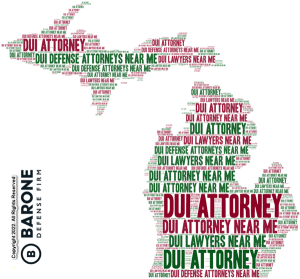Search
Can You Drive After Drunk Driving Arrest Before the Court Date in Michigan?
When you’re arrested for a DUI in Michigan, the arresting officer will take your driver’s license and destroy it. This plastic license will be replaced with a temporary permit or a paper license, depending on the circumstances of your arrest. This paper license differs from your regular driver’s license as it lacks your photo but still permits unlimited driving.
 The police and your attorney will refer to this paper license as a “DI-177.” The title of it is Breath Blood or Urine Report. This is a Michigan Temporary Driving Permit acts as your temporary driver’s license until you’re either convicted of the OWI or your case gets dismissed.
The police and your attorney will refer to this paper license as a “DI-177.” The title of it is Breath Blood or Urine Report. This is a Michigan Temporary Driving Permit acts as your temporary driver’s license until you’re either convicted of the OWI or your case gets dismissed.
This paper license is only issued if you consented to a test allowing law enforcement to measure your blood alcohol concentration (BAC) during your arrest. This does not include the roadside test, only the test back at the station.
Should you decline the chemical breath or blood alcohol test, you’ll receive a DI-93 or Report of Refusal. This document still allows you to drive but only for a period of 14-days, unless your DUI lawyer demands a hearing within that time period.
Michigan abides by the implied consent law, which means individuals applying for a driver’s license implicitly consent to submit to a chemical BAC test. However, you can withdraw this consent. If you do so unreasonably, your license will be suspended for a minimum one year period . Additional penalties may be imposed by the Judge upon a guilty OWI verdict.
The issuance of a temporary license, the DI 177, is promptly recorded on your driving record, even before your arraignment or conviction. Consequently, your driving record reflects your arrest on suspicion of an intoxicated driving offense, including DUI and driving under the influence of marijuana.
During your arraignment, the judge may set certain conditions on your driving privileges as a condition of bond. However, the court is unlikely to revoke or restrict your temporary license unless specific aggravating circumstances exist.
One bond condition may include the requirement that you install a Breath Alcohol Ignition Interlock Device (BAIID). This condition will usually be applicable to on any vehicle you use, which remains in place until your sentencing but can become part of your probation requirements if you’re convicted. Reading this article will help you avoid a false positive on BAIID.
If you plead guilty to your OWI charges or the court finds you guilty, the Secretary of State will send you a notice detailing the sanctions on your driver’s license. This notice may be dispatched approximately two weeks after the conviction and serves as your temporary license until the sanctions expire.
To reinstate your driver’s license, you’ll need to pay a $125.00 fee to the Secretary of State. However, if the penalties upon conviction include license revocation, you won’t be eligible for a temporary license.
Conviction of a DUI in Michigan carries severe consequences, including community service (WWAM), substantial fines, mandatory participation in treatment programs, and a potential prison sentence. A conviction can have lasting implications for your personal relationships and career prospects.
 Patrick T. Barone and all of the trial-ready attorneys at the Barone Defense Firm are here to guide you through the legal processes surrounding an OWI charge. We offer adept legal representation and conduct thorough investigations into your case to determine the most suitable course of action. Call to arrange a free consultation.
Patrick T. Barone and all of the trial-ready attorneys at the Barone Defense Firm are here to guide you through the legal processes surrounding an OWI charge. We offer adept legal representation and conduct thorough investigations into your case to determine the most suitable course of action. Call to arrange a free consultation.
Driver’s License Status During the OWI Charge
In summary, here is a brief timeline outlining how your driver’s license is affected at different stages of your OWI charge:
Immediately after an arrest:
The arresting officer seizes your driver’s license and issues a temporary license. If you agreed to a BAC test, you’ll receive a DI-177 for use until your arraignment. If not, you’ll receive a DI-9 valid for 14 days or until you successfully appeal the refusal in a hearing. It’s important to note that the arrest is already recorded on your driving record.
After arraignment:
The court may impose sanctions on your driving privileges as a bond condition, which could include installing a BAIID and paying bail.
After sentencing:
If your trial results in a not guilty verdict, you can visit the Secretary of State, pay a reinstatement fee, and provided there are no other issues with your license, full privileges will be restored.
If your OWI charges lead to a guilty verdict, you may face the following penalties:
First Offense DUI: (No High BAC Enhancement)
- Six months license suspension and a 30-day driving restriction post-conviction
- Jail time of up to 93 days
- Fines ranging from $100 to $500
- 45 days of community service
- Potential vehicle immobilization (subject to the judge’s discretion)
- Possible BAIID installation as a condition of probation
Second Offense DUI:
- Jail time of five days to one year
- Mandatory one-year license revocation
- Fines between $200 and $1,000
- 30 to 90 days of community service
- Mandatory vehicle immobilization
- Possible BAIID installation as part of probation
Third Offense Felony and Subsequent DUI Offenses:
- Prison time of between one and five years
- Mandatory five-year license revocation
- Fines from $500 to $5,000
- Probation with a minimum period of 30 days in jail time or an alternative.
- 60 to 180 days of community service
- Mandatory vehicle immobilization (subject to the judge’s discretion)
- Potential BAIID installation as part of probation
First-time intoxicated driving offenders may receive a restricted driving license valid for six months. There will be no driving for the first 30 days. For a second offense within 7 years, there will be no driving for a minimum period of one year.
More stringent penalties and harsher outcomes may be enforced for other offenses related to impaired driving, such as in the case of intoxicated driving causing serious injury or death. Also, child endangerment is an enhanced charge.
After the revocation period, you can request a restoration hearing to petition the Secretary of State to reinstate your driving privileges. These hearings can be challenging to win without the guidance of an experienced attorney, and if your request is denied, you’ll need to wait another year.
Facing charges of operating while intoxicated (OWI) or driving under the influence (DUI) in Michigan can be a complex and daunting ordeal. Refusing a chemical test or engaging in aggressive driving behaviors can lead to additional DUI charges. The situation can become particularly perplexing if you’re unfamiliar with the legal process and lack the guidance of a seasoned OWI defense attorney.
At the Barone Defense Firm, our team of adept Michigan DUI attorneys specialize in providing clarity of your legal rights. The renowned DUI lawyers at the Barone Defense Firm boast a track record of delivering top-tier legal support. They also leverage their extensive expertise to secure the most favorable outcomes for our clients.
For further insights into how we can assist you, reach out to the Barone Defense Firm today at (248) 306-9158. We offer free consultations during which we will seek to offer you a clear understanding of your charges and the potential legal consequences of a conviction.

 Michigan Criminal Defense Lawyer Blog
Michigan Criminal Defense Lawyer Blog

